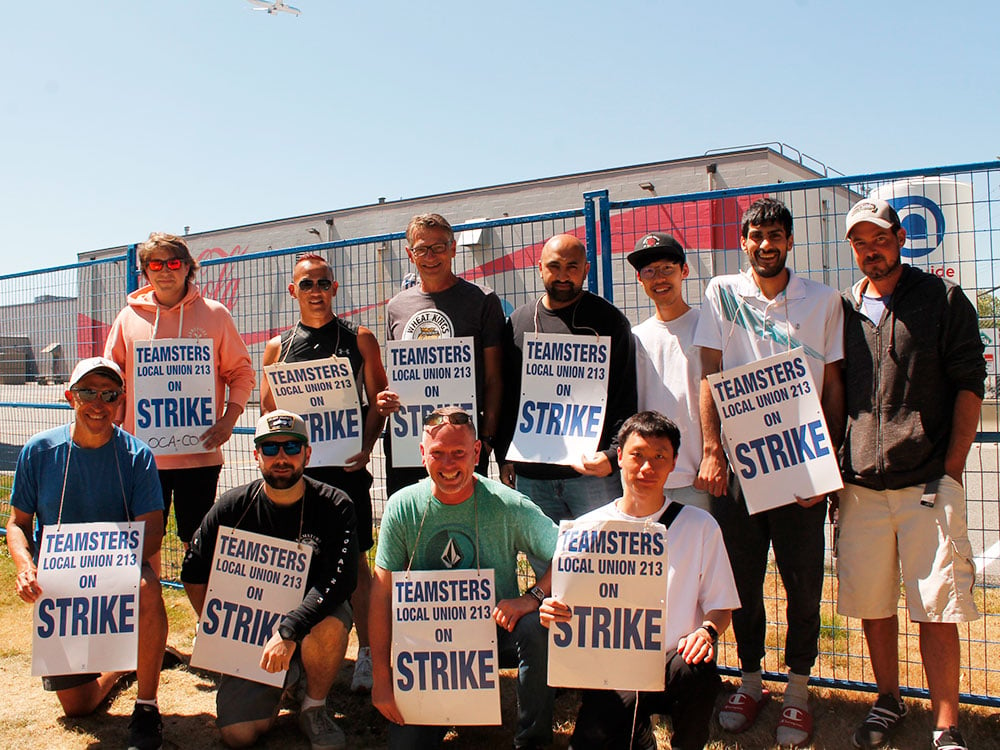Striking Coca-Cola workers in Metro Vancouver caught the company breaking labour laws in apparent effort to keep the soda flowing during a weeks-long shutdown.
The BC Labour Relations Board has twice ordered Coca-Cola Canada Bottling to stop using workers it paid to do the work of striking members of Teamsters Local 213 at its bottling plant in Richmond.
Union members say they caught the company through an impromptu surveillance operation they dubbed a “flying picket line,” which involved Teamsters covertly tailing company trucks and speaking with drivers and passengers.
They found the company has flown in employees from as far as Quebec.
Coke Canada spokesperson Kathy Murphy said in a written statement that the company was “deploying our contingency plan as permitted by British Columbia labour laws.”
But Teamsters Local 213 business agent Jim Loyst said the board found the company’s conduct was illegal.
“They’ve chosen to break the labour code as part of their contingency plan, which obviously creates a lot of frustration on the lines for my members,” Loyst said.
“If the company would just follow the laws and respect them, the focus would be on getting back to the bargaining table.”
Teamsters Local 213 represents more than 400 Coca-Cola employees at the Richmond bottling site and at three distribution centres in the Lower Mainland, as well as another worksite on the Sunshine Coast.
Those workers have been on strike since July 13 after their collective agreement expired earlier this year.
Workers on the picket line say the dispute boils down to wages.
Ron Walsh, who has worked at the Richmond bottling plant for 26 years, said he and his colleagues have seen their expenses skyrocket since the last deal was signed in 2020.
Walsh and his colleagues never stopped working when the COVID-19 pandemic began. In fact, the bottling facility began operating 24-7 to keep up with the steady demand for Coke, A&W root beer and Canada Dry ginger ale. The company’s net sales dipped when the pandemic began, according to its public financial reports, but its profits have rebounded. It reported net revenues of a staggering $43 billion in its most recent fiscal year.
But its workers in the Lower Mainland say their wages have been eclipsed by runaway inflation. Walsh said many workers were hoping for more just to make ends meet in Metro Vancouver.
“We’re just trying to beat some of the inflation that’s happening,” Walsh said.
Workers had hoped picketing the plant would hurt the company enough to push them back to the bargaining table.
The last time workers went on strike in 2017, some local stores reported a shortage of the company’s products on their shelves. But that hasn’t happened this year.
Instead, Loyst said workers on the picket line have seen massive charter buses with tinted windows arriving at the bottling plant each morning, dropping off what appear to be dozens of people at the plant.
“We can observe them wearing safety vests for work boots and some are wearing COVID masks or hoodies, which seem to hide their identities,” Loyst said.
In British Columbia, it is illegal for a company to hire someone to do the job of a striking worker, even if they work for the same employer at a different facility. Legislation calls them “replacement workers”; many union members use the derogatory term “scab.”
But there are exceptions. Managers who fall outside of a collective agreement, for example, are allowed to do the work of striking union members.
Loyst said his members recognized some of the people coming into the bottling facility as managers. But they couldn’t place the others. The company erected a fence around the bottling plant during the dispute, Loyst said, and retained a security company to monitor picketing workers. Loyst claimed those security workers also stood in front of the mysterious workers when they got on and off the buses, meaning union members couldn’t identify them.
Loyst said the union responded by dispatching members to follow company trucks as they left the plant to see who was driving them.
“There’s guys who are out on the road full time who are following to see who is taking a trailer from point A to point B,” Walsh said.
“It’s a lot of fun,” said another union member who did not wish to be named. “You put the Mission Impossible music on, and off you go.”
Loyst said his members eventually identified multiple workers Coca-Cola had apparently brought in, including managers and workers from Prince George, Kelowna and Quebec.
The Teamsters brought a complaint to the BC Labour Relations Board, who issued a bottom-line decision on July 25 stating the company had violated the province’s labour laws and ordering them to stop.
Coca-Cola agreed to a second cease and desist on Aug. 1, Loyst said.
Coca-Cola has not faced any fines as a result of the violations, something Loyst believes highlights a flaw in the province’s labour laws.
“Why do we have to basically play cat-and-mouse to catch them doing something, when they should know better?” Loyst said.
Michelle Travis, a spokesperson with Unite Here Local 40, a union representing thousands of workers in hospitality and food services in B.C., says her union has filed multiple complaints to the labour board about the use of replacement workers and has won some of them. But the province’s labour code doesn’t outline any penalties for employers who break those rules, even though they can undermine a union’s leverage during a strike or lockout.
“If they break the law, I think there is a penalty that should come with it. It shouldn’t be acceptable for an employer to break the code multiple times and they don’t have to pay a stiff penalty,” Travis said.
Meanwhile, Walsh and his colleagues are hoping for a breakthrough at the bargaining table.
William Asomaning, a quality inspector at the Richmond plant, says the sharpest increases were for items like gasoline, rent and groceries — essentials that his family can’t opt out of.
“We were OK. But then with the inflation going on, we went from doing $300 of groceries every month to doing $300 every two weeks. That’s what it’s been for us,” Asomaning said.
Loyst said the company made two offers to the union during 22 days of bargaining, including a wage package that included a 10 per cent hike over three years. Some union members on the picket line said they were hoping for an increase as high as 15 per cent.
In her statement, Murphy said the union was asking for “a magnitude of increases that go beyond what is offered in the industry, across our business and that we simply cannot accept.”
Workers on the line, though, say they are just trying to keep up with the cost of living.
“Our rents have gone up. Groceries go up. Gas goes up all the time. We haven’t taken a raise and we’ve worked through it,” Walsh said. ![]()
Read more: Rights + Justice, Labour + Industry

















Tyee Commenting Guidelines
Comments that violate guidelines risk being deleted, and violations may result in a temporary or permanent user ban. Maintain the spirit of good conversation to stay in the discussion and be patient with moderators. Comments are reviewed regularly but not in real time.
Do:
Do not: